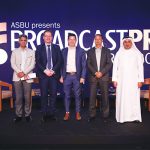During the ASBU BroadcastPro Summit last November, the topic of collaboration and adaptation of common standards within the regional broadcast media industry was touched upon in the panel discussions. The general consensus was that an improved, cooperative environment among the various building blocks of the industry was essential to its continuous development. The importance of […]

During the ASBU BroadcastPro Summit last November, the topic of collaboration and adaptation of common standards within the regional broadcast media industry was touched upon in the panel discussions. The general consensus was that an improved, cooperative environment among the various building blocks of the industry was essential to its continuous development.
The importance of standards in the industry continues to grow, yet simultaneously the technological developments and convergence of technologies and businesses impose new demands on standards-making processes. Standards act as an instrument for enabling the development of a harmonised, stable and globally recognised framework for the dissemination and use of technologies, best practices and agreements, which in turn support the overall growth of the broadcasting industry.
The success of adopting any new technology is based on common standards and requires a non-fragmented market place to succeed. The Arab world comprises twenty two countries and each has its own set of rules and regulations despite the fact that the broadcast market across the Arab world is essentially one. Hundreds of satellite TV channels can be received anywhere across the Arab world and it is important that the viewers have a uniform entertainment experience with consistent services and common reception equipment; but this is not always the case. The issue of non-standardised implementations of broadcasting systems is apparent on the delivery side of the broadcasting chain due to a lack of standardised regulation across the region.
The Arab States Broadcasting Unions (ASBU) Technical Committees and Working Groups have played an important role in strengthening ties and promoting cooperation among broadcasters in the Arab States for better production and content development. Despite this push, their influence is still limited to state broadcasters. Such entities comprise a relatively small percentage of the overall regional broadcasting scee, thus limiting the impact of ASBU efforts.
Out of approximately 700 TV channels currently broadcasting in the Arab world, only 15 % are run by state broadcasters. The rest are privately owned TV channels including TV networks such as OSN, ADD, MBC, Al-Jazeera, and Rotana.
It is increasingly difficult to agree on common standards today because research and development is often conducted by the commercial industries that often have different objectives from the public bodies. Furthermore, the selection of a specific technology is closely interlinked with commercial and political issues.
That being said, every entity, whether private or public can participate in standards development and exert their influence by participating in and establishing general Collaboration Forums in broadcasting. This would promote the adoption and implementation of consensus-based standards throughout the region and to produce recommendations that can eventually be implemented as de-facto standards among the participating members. The objective of such forums would be to encourage sharing of ideas in certain fields without pushing to develop regulations in the sense of mandatory rules but rather adopting noncompulsory accepted technical standards. In order to adopt such standards, it is imperative to draw on contributions from various industry sectors and encourage private broadcasters to become active members of these collaboration forums.
The Arab HDTV Group is a productive collaboration forum that works under the ASBU umbrella and is open to all TV broadcasters in the Arab world, broadcasting unions, Arab satellite operators and equipment and receiver manufacturers. This group has made recommendations on the adoption of various technologies on both the production and transmission standards of HDTV. The groups next meeting later this year welcomes all the relevant private and public entities to register as members and participate in its activities.
It is an ideal time for all parties to participate in developing recommendations and maintaining standards for the regional industry to create a lasting foundation for the broadcasting technologies and services. The relationship between the technical heads and regional broadcasters remains cooperative with information sharing in regards to experiences with different systems and technologies.
We can take this further and translate it into a more formal industry-wide collaboration or standardisation forum. It is vital that we seek to achieve consensus to reinforce any specification to support not only the anticipated services but future services as well.
If we are to develop a broadcasting ecosystem that meets the needs of both users and providers, we must encourage further collaboration. The region has a powerful and dynamic mix of skills, resources and ambitions which can bring about the use of the very best technologies, practices, and services in the marketplace.
Hasan R. Sayed Hasan is Managing Director of Master Media and Vice Chair of ASBUs Arab HDTV group
















































































